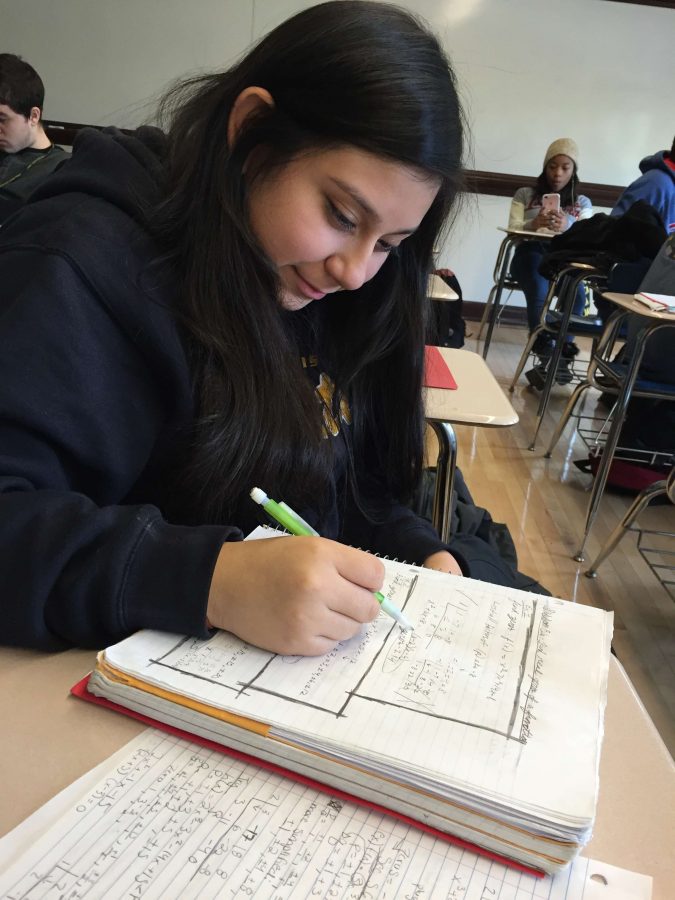Hey, whatever happened to that PARCC test?
Crystal Salgado, Div. 986, works on a polynomial problem in preparation for the SAT, which will be given April 5.
Just hearing the word PARCC, most students will let out an involuntary groan of frustration.
In 2015, Illinois became one of 24 states to administer the PARCC test to students in 3rd through 9th grade, according to the Chicago Tribune. PARCC, also known as Partnership for Assessment of Readiness for College and Careers, was administered to all English I and Algebra I students at Lane, as well as LTAC students.
According to the Chicago Tribune, 44,000 students did not to take the Language Arts portion of the PARCC, and 42,000 did not take the math portion across the state in 2015. Overall, 4 percent of the one million students in Illinois did not take the test.
“I don’t blame them for opting out,” said Mr. Eric Golden, who teaches Algebra I to freshmen. “If I had the option of taking a test or sitting in the lunchroom with my friends, I’d opt out too.” He estimated that out of four periods of Algebra I, 90 out of his 120 students opted out.
Many students opted out, but for many different reasons. Crystal Salgado, Div. 986, opted out of PARCC her freshman year, but took the PARCC when she was in eighth grade.
“No one likes the PARCC,” Salgado said. “The teachers never really prepared us; it was just kind of thrown on us at the last minute.”
When students opted out, they were taken to the library, where they had options similar to a free period, Salgado said.
One student who did take it, Tabassum Yousuf, Div. 959, did not think PARCC was beneficial.
“I think PARCC was really confusing,” Yousuf said. “I would say they worded the questions very confusingly and it made basic material seem difficult.”
When introducing PARCC, in 2014, Tony Smith, State Superintendent of Education, justified the state’s decision to administer PARCC.
“Guaranteed access to the exam best ensures that students in Illinois, especially those who are most in need, have opportunities in higher education they might otherwise not receive,” Smith wrote in a public letter from the Illinois State Board of Education.
PARCC was also one of the first tests to be administered digitally, according to The State Journal Register.
Roger Eddy, head of the Illinois Association of School Boards, supported the decision to eliminate PARCC for high schoolers. “I think it is important if we’re looking at assessments, we should eliminate duplication,” Eddy told the Chicago Tribune. Eddy also justified the removal of PARCC because the results of the exam were not accepted by colleges.
Most students who took it did not get their scores back at all, according to Salgado.
“We never got our scores,” Salgado said. “I think it’s a common expectation that when you take a test, you get your scores back to see how you did. The teachers could use the scores to help them understand how they could improve their teaching strategies. Sometimes I wonder where the scores went and who was looking at my PARCC scores.”
This, among many other reasons, caused many students across Illinois, and at Lane, to refuse to take the test. In the first year of the PARCC test, students needed to obtain a parent’s permission before they could opt out. In 2015, however, students did not need a parent’s permission to opt out, according to Golden. Illinois spent $57 million to launch PARCC in 2014, according to The State Journal Register.
This year, Illinois announced that the PARCC would be discontinued at the high school level and replaced with the SAT and SAT-aligned tests, which has been met with relief from both students and teachers.
The new SAT emphasizes a “focus on the knowledge, skills, and understandings that research has identified as most important for college and career readiness and success,” according to the College Board.
Teachers at Lane are also preparing for this change by having meetings focused on how they can prepare their students for the SAT. This month, the teachers focused on how to bring SAT test prep into the everyday curriculum for students by analyzing questions they already use on their current assessments.
Your donations directly fund the Lane Tech student journalism program—covering essential costs like website hosting and technology not supported by our school or district. Your generosity empowers our student reporters to investigate, write, and publish impactful stories that matter to our school community.
This website is more than a publishing platform—it's an archive, a research tool, and a source of truth. Every dollar helps us preserve and grow this resource so future students can learn from and build on the work being done today.
Thank you for supporting the next generation of journalists at Lane Tech College Prep!

Sam Schnoes is a current senior at Lane Tech. She is the current news editor of the Warrior. In her free time, she enjoys horse riding, listening to music...




